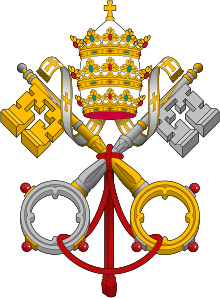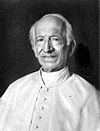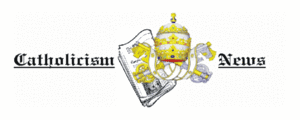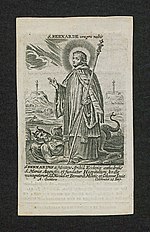Portal:Catholic Church
Introduction The Catholic Church, also known as the Roman Catholic Church, is the largest Christian church, with 1.39 billion baptized Catholics worldwide as of 2022. It is among the world's oldest and largest international institutions, and has played a prominent role in the history and development of Western civilization. The church consists of 24 sui iuris churches, including the Latin Church and 23 Eastern Catholic Churches, which comprise almost 3,500 dioceses and eparchies located around the world. The pope, who is the bishop of Rome, is the chief pastor of the church. The Diocese of Rome, known as the Holy See, is the central governing authority of the church. The administrative body of the Holy See, the Roman Curia, has its principal offices in Vatican City, a small independent city-state and enclave within the Italian capital city of Rome, of which the pope is head of state. The core beliefs of Catholicism are found in the Nicene Creed. The Catholic Church teaches that it is the one, holy, catholic and apostolic church founded by Jesus Christ in his Great Commission, that its bishops are the successors of Christ's apostles, and that the pope is the successor to Saint Peter, upon whom primacy was conferred by Jesus Christ. It maintains that it practises the original Christian faith taught by the apostles, preserving the faith infallibly through scripture and sacred tradition as authentically interpreted through the magisterium of the church. The Roman Rite and others of the Latin Church, the Eastern Catholic liturgies, and institutes such as mendicant orders, enclosed monastic orders and third orders reflect a variety of theological and spiritual emphases in the church. Of its seven sacraments, the Eucharist is the principal one, celebrated liturgically in the Mass. The church teaches that through consecration by a priest, the sacrificial bread and wine become the body and blood of Christ. The Virgin Mary is venerated as the Perpetual Virgin, Mother of God, and Queen of Heaven; she is honoured in dogmas and devotions. Catholic social teaching emphasizes voluntary support for the sick, the poor, and the afflicted through the corporal and spiritual works of mercy. The Catholic Church operates tens of thousands of Catholic schools, universities and colleges, hospitals, and orphanages around the world, and is the largest non-government provider of education and health care in the world. Among its other social services are numerous charitable and humanitarian organizations. (Full article...) Selected article
 Catholic social teaching comprises those aspects of Catholic doctrine which relate to matters dealing with the collective aspect of humanity. The foundations of modern Catholic social teaching are widely considered to have been laid by Pope Leo XIII's 1891 encyclical letter Rerum Novarum. A distinctive feature of Catholic social teaching is its concern for the poorest members of society. This concern echoes elements of the Jewish law and of the prophetic books of the Old Testament, and recalls the teachings of Jesus Christ recorded in the New Testament, such as his declaration that "whatever you have done for one of these least brothers of Mine, you have done for Me." Another distinctive feature of Catholic social doctrine is the way in which it has consistently critiqued modern social and political ideologies both of the left and of the right: communism, conservatism, socialism, libertarianism, capitalism, liberalism and Nazism have all been condemned, at least in their pure forms, by the Popes at one time or another.
Selected image
 Credit:Click picture for information 6th century mosaic in Ravenna portrays Jesus dressed as a philosopher king in a cloak of Tyrian purple. He appears as the Pantokrator enthroned as in the Book of Revelation, with the characteristic Christian cross inscribed in the halo behind his head. Selected biography
 James VI and I (19 June 1566 – 27 March 1625) was King of Scots as James VI, and King of England and King of Ireland as James I. He ruled in Scotland as James VI from 24 July 1567, when he was only one year old, succeeding his mother Mary, Queen of Scots, who had been forced to abdicate. Regents governed during his minority, which ended officially in 1578, though he did not gain full control of his government until 1581. On 24 March 1603, as James I, he succeeded the last Tudor monarch of England and Ireland, Elizabeth I, who died without issue. He then ruled England, Scotland and Ireland for 22 years, until his death at the age of 58. James achieved most of his aims in Scotland but faced great difficulties in England, including the Gunpowder Plot in 1605 and repeated conflicts with the English Parliament. According to a tradition originating with historians of the mid-seventeenth-century, James's taste for political absolutism, his financial irresponsibility, and his cultivation of unpopular favourites established the foundation for the English Civil War.
Did you know...
Related portalsFeast Day of May 28
He gave his name to the Saint Bernard breed of dog, originally bred for the cold environment of the hospice. (Full article...)
Selected quoteNews
SubcategoriesTopics
The Holy Bible:
Particular Churches (grouped by liturgical rite):
Things you can do
External resourcesWikiProjectsAssociated WikimediaThe following Wikimedia Foundation sister projects provide more on this subject:
Discover Wikipedia using portals |




































